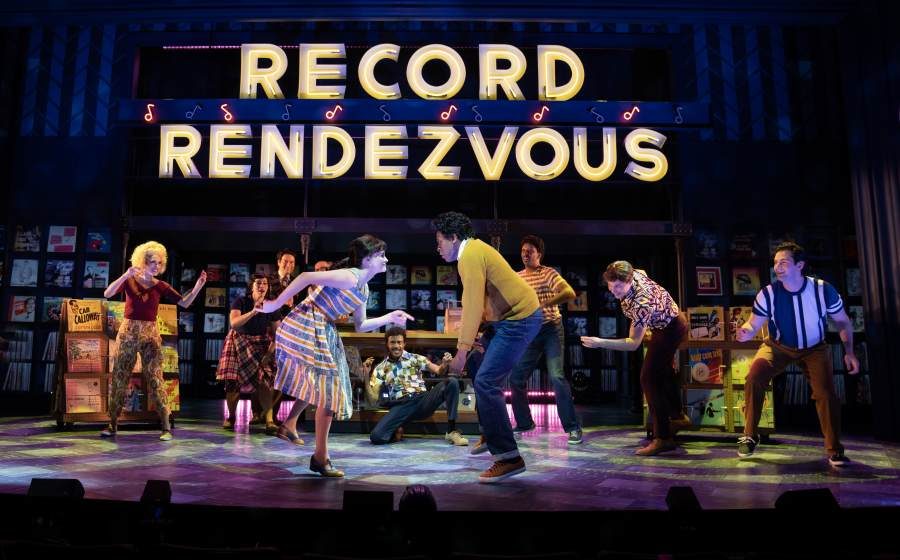

Ever heard of Alan Freed? If so, then you might enjoy Rock & Roll Man, the musical at New World Stages. Freed was the risk-taking disc jockey who coined the term “Rock and Roll” but his influence was far greater than that. He introduced Black music to white audiences on the air waves. However, the show, co- written by Larry Marshak and Rose Caiola, portrays Freed as a somewhat naive music lover who, although he championed the music, didn’t actually intend to break cultural boundaries.
The show begins with an ailing Freed who dreams his reputation is on trial. He is defended by the flamboyant Little Richard ( well- played by Rodrick Covington dressed in skin tight gold lame clothing.) J. Edgar Hoover (Bob Ari playing all the authority figure roles) accuses him of the destruction of the American way of life. It’s always a challenge for playwrights to find creative devices to present jukebox musicals. Yet I found this device a bit flimsy.
With a ‘judge’ presiding over the case, the musical flashes back to Freed’s first introduction to rock and roll, beginning with his meeting with Leo Mintz, a nerdy record shop owner in Ohio.
The show stars Constantine Maroulis as Freed who does a fine job. But how do you cast a performer like Maroulis and not have him sing? Since Alan Freed was a DJ and concert promoter and not a singer, the show provides him with a few original songs. (Gary Kupper-composer, lyricist, co-writer.) The songs show off Maroulis’ fine voice but, personally, I found myself wishing he had performed some of the oldies instead.
Joe Pantoliano plays two roles, one in each act. In the first he plays Leo Mintz, owner of the record store where Freed discovers the ‘new music.’ Together they introduce it on the radio, daring to anger the staid conservative white station managers and parents.
Later he plays Morris Levy, a local mobster with dubious connections. Freed makes deals with him to finance his rock and roll shows. Pantoliano is too much of a stereotype, overdoing his Jewish accent and Yiddish expressions. He’s a cartoon, detracting from Freed’s problems.
The best part of the musical for many in the the older audience is the oldies music, superbly performed by an ensemble cast. The music from singers such as the Coasters, Laverne Baker, Little Richard and Chuck Berry includes “Sh-Boom,” “Sincerely,” “Tweedle Dee” and “Roll Over, Beethoven.”
There are several familiar names like Frankie Lymon (played by Jamonte) Chuck Berry (Matthew S. Morgan) and Bo Diddley ( Eric B. Turner.) Valisia Lekae sings three numbers as LaVerne Baker. She is the only character who comments on the racial inequities of the time.
The first act flies by, filled with music and dancing. The performance could have easily been presented on a bigger Broadway stage. Sadly the second act is much longer. There's more story crammed in and it’s slower and bogs down. Marshak and Caiola want to include Freed’s personal story but know the audience wants the music.
The musical performances are well-done, and the talented singers sound enough like the original groups to appease the audience. It is like having a cover band perform the songs-;they are close but not the originals.
There’s a story to be told here but the musical doesn’t do it justice. Freed's personal issues get short-changed with a few brief phone calls with his daughter and a couple of quick exchanges with his wife. Maybe his personal life and alcoholism didn't need to be included at all.
The older audience at the theater was the same group that would have purchased tickets for an oldies show. And for the most part, they weren’t disappointed. Gingerly, many swayed in their seats or clapped along with the music.
Alan Freed didn't create the music but he named it and courageously promoted it. Rock and Roll Man reminds us that he did leave a lasting legacy. One need only look at history to reinforce his contribution. "Alan Freed did as much if not more for racial equality as anyone." Rosa Parks
New World Stages
340 West 50th Street
New York, NY